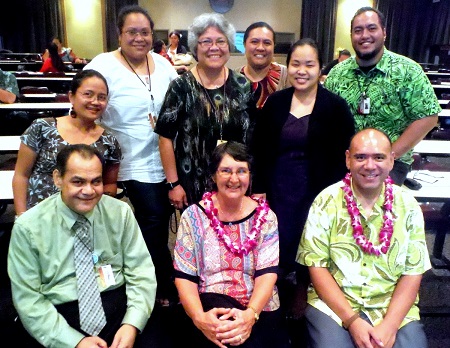
Renowned assessment authority Dr. Mary Allen (center, seated) takes a photo opportunity with members of the ASCC faculty and staff. (Photo: J. Kneubuhl)

Renowned assessment authority Dr. Mary Allen (center, seated) takes a photo opportunity with members of the ASCC faculty and staff. (Photo: J. Kneubuhl)
ASCC Hosts Workshop by Renowned Assessment Authority
August 24, 2015
By James Kneubuhl, ASCC Press Officer
During orientation week for the fall 2015 semester, the faculty and staff of the American Samoa Community College (ASCC) took part in a three-day Assessment Workshop presented by renowned authority on the subject Dr. Mary J. Allen, who for many years has served as a consultant in higher education, specializing in assessment and accreditation. A former director of the California State University Institute for Teaching & Learning, and a professor emerita of Psychology from California State University, Bakersfield, she has published books on the assessment of academic programs and general education. As a sought- after speaker, consultant, and workshop presenter, Dr. Allen has worked with over 150 colleges and universities across the nation.
As defined by Dr. Allen, assessment provides an ongoing process to monitor and improve student learning. “Authentic assessment focuses our attention on the kinds of learning that students will use for the rest of their lives,” she said, “and emphasizes the deep and lasting learning we want to promote in our students.” Assessment also forms one of the bedrocks of Outcome Based Education (OBE), a theory that bases each part of an educational system around specified goals (outcomes). In OBE methodology, course content, application opportunities, and assessments are all focused on helping students achieve a specific outcome by the end of an educational experience. “OBE focuses courses on helping students do things rather than just memorize things,” Dr. Allen observed.
Over the course of her workshop, Dr. Allen guided the ASCC faculty and staff through a number of processes focused on Student Learning Outcomes, and also illustrated how these same processes can be applied to strengthen Course Learning Outcomes, Program Learning Outcomes and even Institutional Learning Outcomes. She emphasized the importance of creating rubrics for each course that clearly state the desired outcomes as well as the criteria for measuring levels of achievement. “Experience has shown that students who are clear about the desired Learning Outcomes end up learning more,” Dr. Allen shared. “It gives them a way of focusing the different aspects and elements of a course around a central idea.”
Dr. Allen utilized frequent hands-on exercises to help keep the theoretical workshop content firmly grounded in the everyday experience of educators. The faculty and staff in attendance frequently worked in pairs or in teams to collaborate on assignments such as creating course rubrics, followed by “calibrating” their rubric contents within the expanded context of department and institutional goals. While tools such as rubrics serve to clarify desired outcomes and provide reasoned criteria for assessment, Dr. Allen stressed the importance of “closing the loop” or applying the results of assessment to the refinement of courses, departments and/or institutions.
“Assessment is just a tool,” she told the ASCC participants. “Just collecting evidence does not improve learning. A thermometer does not cure a fever, nor can you fatten a pig just by weighing it. Closing the loop is a crucial last step that is sometimes forgotten, but when done well, assessment leads to incremental improvements in our courses and programs. The bottom line is, assessment is for our students.”
A number of ASCC faculty and staff expressed their appreciation for Dr. Allen’s workshop, and spoke of how it has given them new insights into improving accountability on the part of instructors, administrators and students. “We need this across-the-board type of training so that everyone understands the purpose of assessment and how important it is that we implement it for the sake of our students' learning,” said Ms. Shirley Delarosa of the Teacher Education Department. “If done correctly, assessment will not only give us a clearer picture of how we are doing as instructors, deans, and administrators in terms of students' achievement, but it will also help us see how our students are doing and how we can assist them to better achieve.”
Business Department instructor Papalauena Iaopo Tauai commended Dr. Allen’s treatment of the complex subject matter in down-to-earth terms. “I thank Dr. Allen for an effective presentation,” said Papalauena. “She presented a complicated process using everyday language and easy to understand examples. I gained confidence through completing the workshop assignments on course assessment, and a better understanding of ‘closing the loop’ to improve courses and student learning. It changed the way I look at teaching and the importance of learning outcomes and rubrics.”
In addition to her career as a speaker, Dr. Allen has published four books: “Introduction to Psychological Research” (1995); “Introduction to Measurement Theory” (2001); “Assessing Academic Programs in Higher Education” (2003); and “Assessing General Education Programs” (2006).
